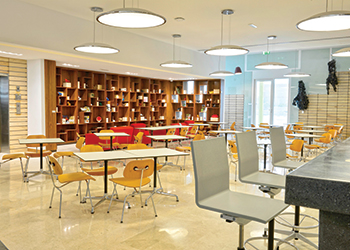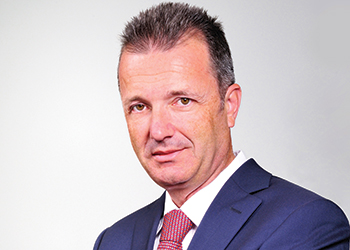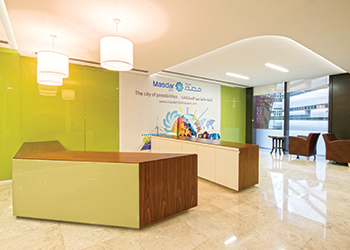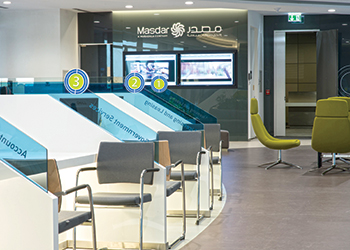 A café interior done by Summertown Interiors ... sustainable.
A café interior done by Summertown Interiors ... sustainable.
Summertown Interiors has achieved 100 per cent success rate on all Leed certification applications
Summertown Interiors, a specialist in delivering green interiors and a preferred fit-out partner for Masdar City in the UAE, the world’s first sustainable city, recently executed jobs for Masdar Business Centre and Masdar One Stop Shop.
The Masdar Business Centre project – carried out in partnership with renowned design firm Bluehaus Group – reflects the high-end sustainability measures incorporated in the base building itself and is geared towards creating a modern workspace while meeting environmental goals, commented Marcos Bish, managing director of Summertown.
“Summertown has successfully achieved high-quality finishing while offering a value engineered solution that met the budget requirements of the client,” he says.
“We are proud to be the contractor of choice for a number of clients and have recently completed projects in partnership with renowned architect firms such as Gensler and Perkins + Will. Projects that are close to our heart, as they reflect our passion and integrated approach to sustainability, are The Change Initiative in Dubai, for which we have achieved the highest number of points for a Leed (Leadership in Energy and Environmental Design) Platinum rated interior, and our projects for Masdar City, one of the most iconic sustainable projects in the UAE.”
Summertown was the first fit-out contractor in the UAE to receive Leed Gold certification for its head offices in Jebel Ali, Dubai, and holds the top position in the country in terms of executing the highest number of registered Leed interior projects.
“We also enjoy a 100 per cent success rate on all Leed certification applications we process on behalf of clients,” says Bish.
 |
Bish ... overcoming challenges. |
Each project, according to Bish, is unique and has its own challenges. “For some, the challenge is the tight time frame, for others it may be strict requirements. Careful planning, diligent management of submissions and approvals, as well as transparent communication between client and partners involved always results in successful completion with minimal snags for the client upon handover.
“At an industry level, one of the biggest challenges we face when we work on sustainable interior fit-out projects is the availability of green products, although over the past few years we have noticed progress in diversification and cost of sustainable materials. Also, the lack of mandatory sustainability reporting and clear regulations when it comes to recycling and reusing old materials makes the education process in the UAE more difficult,” he says.
Many of Summertown’s ongoing projects are in Abu Dhabi, where it has recently won two new major projects. “We have seen a steady stream of business in the capital lately, which is a good indicator that this market segment is steadily growing, particularly in the premium office sector,” he points out. “In Dubai, we have recently won a major green project. It’s good to see that sustainability is high on the agenda for many global and local companies alike as more organisations start to embrace the green movement.”
 |
Masdar Business Centre. |
Summertown is currently in the process of obtaining Leed Ebom (Leed certification for existing building and maintenance) for its head offices in Jebel Ali, which Bish describes as a “special project to us and an important step in our journey to become carbon neutral by 2020”.
Leed Ebom is a tool for ongoing operations and maintenance of existing commercial and institutional buildings.
The certification system identifies and rewards current best practices and provides an outline for buildings to use less energy, water and natural resources, to improve the indoor environment and to uncover operating inefficiencies.
It also helps building owners and managers improve building performance, and maintain and improve this performance over time by reducing cost streams associated with building operations, reducing the environmental impacts, and creating healthier and more productive employee workspaces.
The process requires implementation of policies in relation to building operations, maintenance, sustainable purchasing of materials, equipment and consumables, and extensive monitoring and tracking of operations for the building. It also recognises the value of human capital and considers the value of employee wellbeing as a critical success factor to achieving excellence in sustainability.
In order to ensure that Summertown’s headquarters meets the compliance standards for Leed Ebom certification, the project entailed some modification works to the existing Leed-certified premises. This included installation of water submeters to allow for more detailed monitoring of water consumption by zone, installation of energy monitoring units to allow for real-time collection of energy consumption data, renovation works to its outdoor space to increase the covered parking area, and MEP (mechanical, electrical and plumbing) works including installation of additional CO2 (carbon dioxide) sensors to measure indoor air quality, and modification to air-conditioning works.
“We have also refined our existing ISO processes to ensure all our operational procedures consider their impact on our ability to continually track and monitor our carbon footprint and achieve the sustainability goals that we have set out to achieve.
“We feel that it is important for companies to recognise the value that such a framework can add, enabling building owners to maximise on the investment in a commercial office premises. In the construction industry, sustainable fit-out has become higher on the agenda for many clients and Summertown can offer added value to our clients by sharing its first-hand experience on managing operations in a sustainable manner,” says Bish.
 |
The Masdar One Stop Shop. |
“Although Summertown was built on an integrated approach to sustainability since the beginning, being a pioneer in the region, we expect that in the next 15 years, with the recent adoption of the new UN Sustainable Development Goals for 2030, we will see a total shift in the construction and fit-out industries towards sustainable development models. New regulations will be adopted, higher standards and consumer demand will increase pressure on the industry to implement environmentally-responsible practices, and awareness and understanding of green practices at all levels of the construction chain will increase. In the near future, sustainable projects will be the norm, not the exception,” he remarks.
There are also several movements driving change in the workspace that will have an impact on the way offices will be designed and fitted over the next few years, says Bish. “The workspace of the future will create the right environment for creativity, engagement and collaboration while positively impacting businesses’ bottom lines. Employee health and well-being is a focus for businesses more than ever.
“Good indoor air quality has been proven to improve levels of concentration and productivity, pressing designers to identify ways to improve access to natural light and clean air flow, and the fit-out industry to use materials and practices that are environmentally friendly, have a minimum footprint and are not hazardous for the occupants’ health. Employee mobility, re-configurability of furniture and the seamless integration of technology in the workspace will also influence office design over the coming years.”
With the UAE having embarked on a sustainable development path outlined under its ‘UAE Vision 2021’, Bish says this reinforces the need for the commercial fit-out industry to lead the development of sustainable workspace in the region. “One of the objectives of the UAE Vision 2021 is to enhance the adoption of international sustainability standards in the country, which is a great opportunity for our industry to raise awareness of green interior certifications and press for specific legislation regionally, following the example of Europe and North America. At Summertown, we will do our best to facilitate the adoption of green interior certifications, which at the moment lack a mandatory status in the UAE,” he says.
Expansion
The company’s green turnover has been growing continuously since 2009. It has delivered nine Leed-certified interior projects in the UAE, including the highest rated Platinum interior project in the region. “This year, 64 per cent of our completed projects were green, satisfying either local sustainability criteria or Leed certification. Sustainable practices have also helped us manage our costs more efficiently and have positively impacted our profits, resulting in revenue growth of 25 per cent last year. We expect to continue to grow following this same path, with more revenue coming from green projects and our fixed costs minimised by our sustainable practices.
“We are also looking to play an active role to support the infrastructure development of Expo 2020 Dubai, lending our expertise to help contribute to this being the first sustainable world expo,” Bish concludes.
Summertown Interiors was established in 1997, and is today among the UAE’s leading fit-out contractors with specialist experience in delivering commercial office, education and retail projects for global Fortune 500 companies, government authorities and local businesses. It has built an impressive portfolio of clients and projects with many seeking Summertown’s expertise for subsequent expansion projects. The company’s clients include companies such as AXA, Siemens, Lexus, ES Bankers, 3M and Astellas, as well as major government entities such as Mubadala and the Higher Colleges of Technology.








.jpg)




.jpg)




























.jpg)
































